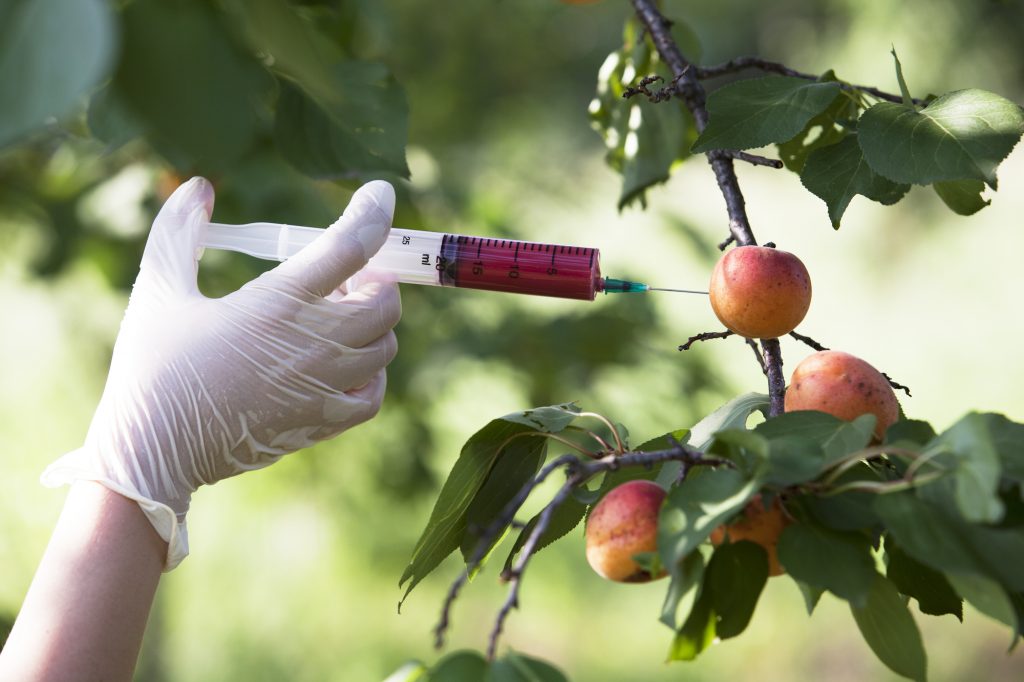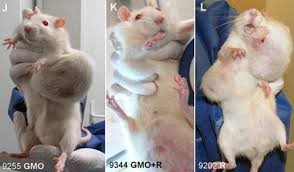
Amidst massive lawsuits, labeling controversies and increasing public awareness, the controversy over genetically modified foods continues. In Part 1 of this two-part series, we get clear about what GMOs actually are, their intimate relationship to the herbicide glyphosate and how they may be linked to Breast Cancer.
What Are GMOs Anyway?
GMO stands for Genetically Modified Organism. There are many reasons why genetic manipulation of a food product may occur. Most of the time, GMOs are created in order to “turn off” certain traits within a plant that make it naturally resistant to a particular herbicide. Genetically-engineered substances are also used in U.S. commercial dairy operations, even though many countries have banned it’s use.
Genetic modification in dairy comes in the form of Monsanto’s “rBGH” or “rBST” (recombinant bovine growth hormone). This GM hormone is injected into milk-producing cows to increase their output. The most common practice, however, is seen in crops that are “Roundup Ready.” Roundup®, again produced by Monsanto, uses glyphosate as its main ingredient. When sprayed on non-GM plants, the toxin causes certain mechanisms in crop plants themselves to shut down.
One would think this fact in itself would have been a wake-up call that something was drastically wrong with this harmful herbicide. This was not the case, however. Beginning in the 1980’s, scientists at Monsanto worked to develop crops that were genetically “ready” to receive the herbicide and not die off or get sick in response.
GMO and Glyphosate-Dependent Agriculture
The result is a commercial agricultural industry that now heavily relies on a new batch of Roundup Ready® GMO seeds year after year. According to the United State Geological Survey, as of 2007, more than 88,000 tons of glyphosate was used in the U.S. The amount rises significantly each year, in large part in response to “super weeds” that are herbicide resistant. According to a report compiled by the non-profit group GMO Awareness, agribusiness operations using GM seeds were “responsible for a 527 million pound increase in herbicide use in the United States over the first 16 years of commercial use of GM crops (1996 – 2011).”
The most important take away here is that GMOs and glyphosate go hand in hand. What’s more, the majority of GM crops in the US consist of products that most Americans eats every day: sugar, wheat, corn and soy.
For a complete list of GMO crops, visit this resource on the GMO Project website.
GMOs and Breast Cancer
One scary fact is that since the mid-1990’s, when GM foods were introduced, the number of people with food allergies and digestive disorders, as well as children born with autism, has skyrocketed. Today 13% of the population suffers from 3 or more chronic diseases, a jump of 5% in just one decade. At the same time, a new study has linked Roundup use to lower brain function and lower neurological resiliency.

Experts with the American Academy of Environmental Medicine (AAEM) actually expressed concern back in 2009, when GM technology had only been around commercially for a little more than a decade. In an official report, they cite many studies which, even then, revealed GM foods’ tendency to affect the liver and kidneys and to ignite inflammatory responses.
“…because of the mounting data, it is biologically plausible for Genetically Modified Foods to cause adverse health effects in humans,” lead authors Amy Dean, D.O. and Jennifer Armstrong, M.D. wrote.
The study that most makes the correlation between GMOs and Breast Cancer was a 2012 investigation conducted by the French government that found a significant correlation between female rats who were fed GMO corn and mammary tumors.
The “Roundup Ready” corn-fed rats also displayed hormonal imbalances and irregularities in pituitary gland function. To date, this is the largest study on record to investigate the effects of life-long GM corn consumption.
Interestingly, shortly after the study was published, the editors of Food and Chemical Toxicology issued a retraction notice for it (a retraction is a statement indicating that a peer-reviewed article “should be considered invalid as a source of knowledge’). In response, the researchers had this to say:
“…75% of our first criticisms arising within a week, among publishing authors, come from plant biologists, some developing patents on GMOs… and from Monsanto Company who owns both the NK603 GM maize and Roundup herbicide (R).”
Next Week: Labeling Laws, New Glyphosate Research & What You Can Do
In 2015, the International Agency of Research on Cancer determined glyphosate to be a “Grade 2a carcinogen.” Still it continues to be used on crops, potentially effecting more people’s health every year.
In my opinion, the verdict is in when it comes to GMOs. My advice is to stay away! And next week, you will learn how to do just that. In Part 2, I will also talk about actions being taken regarding safety and labeling (some great and some not so good), the latest cancer-glyphosate research and, most importantly, what YOU can do to make your Healthy Breast journey as GMO and glyphosate-free as possible!
Dr. Veronique Desaulniers (“Dr. V”) is the founder of Breast Cancer Conqueror.com and The 7 Essentials System ™. This step-by-step guide empowers you with knowledge so you Never Have to Fear Breast Cancer Again! To watch a FREE webinar about the 7 steps for beating breast cancer naturally, Click Here
